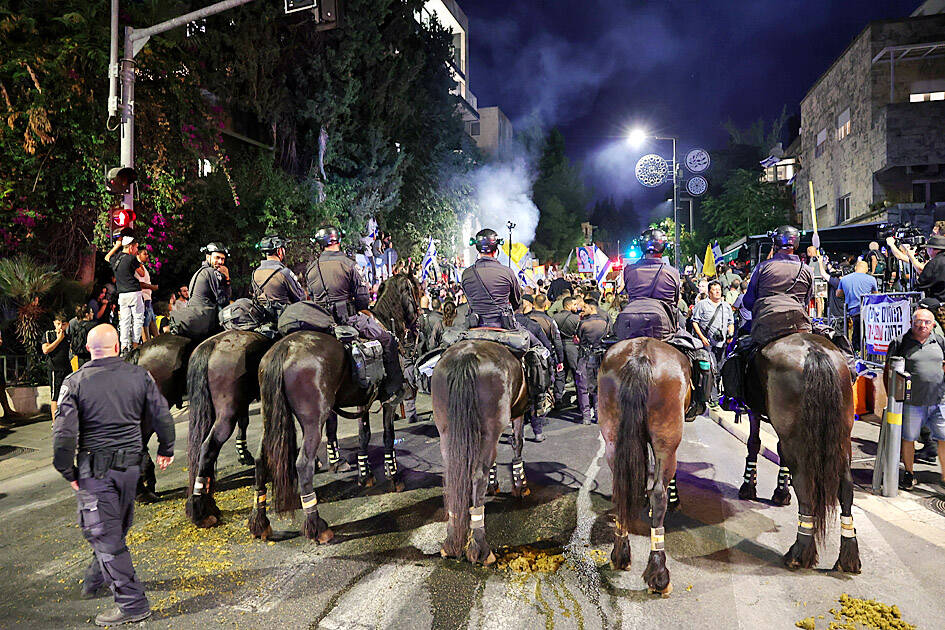Concerns grew yesterday over the chances of securing a Gaza truce, a day after Israeli Prime Minister Benjamin Netanyahu rejected making any “concessions” in stalled talks toward a hostage release deal.
Netanyahu told a televised press conference at the end of a day of nationwide protests that he would “not give in to pressure” to renege on demands in indirect negotiations with Hamas to end the war, now nearing its 12th month.
Gripped by grief and fury after six dead hostages were recovered from Gaza, Israelis took to the streets on Sunday and Monday to ramp up pressure on their government to secure the release of the remaining captives.

Photo: EPA-EFE
The military said the six were all captured alive during Hamas’ Oct. 7 attack on southern Israel that triggered the war, and shot dead by the captors shortly before troops had found them.
“These murderers executed six of our hostages,” said Netanyahu, who has increasingly faced accusations from critics in Israel, as well as Hamas officials and analysts, of prolonging the war for political gain.
US President Joe Biden, who on Monday met negotiators working alongside Qatar and Egypt to try to secure a truce deal, replied “no” when asked by reporters in Washington if he thought Netanyahu was doing enough to secure a hostage deal.
“I will not give in to pressure,” Netanyahu told the press conference, saying Israel must control Gaza’s border with Egypt to stop Hamas from rearming.
Israeli daily Haaretz said Netanyahu was “masking his motives with security concerns,” but said he was primarily concerned with his own political survival.
“His coalition... might unravel if a Gaza deal goes through,” it said.
Netanyahu again called for “maximum pressure on Hamas” and stated that “the achievement of the war’s objectives” requires control of the Philadelphi Corridor along the Gaza-Egypt border.
Adding to the pressure on Israel, Britain on Monday said it would suspend some arms exports, citing a “clear risk” they could be used in a serious breach of international humanitarian law.
Meanwhile, fighting raged on in Gaza, where civil defense rescuers reported two killed, including a child, in an Israeli strike that hit a displacement camp near Khan Yunis yesterday.
The civil defense agency as well as witnesses and war correspondents reported more airstrikes and artillery shelling across southern and central Gaza.

The CIA has a message for Chinese government officials worried about their place in Chinese President Xi Jinping’s (習近平) government: Come work with us. The agency released two Mandarin-language videos on social media on Thursday inviting disgruntled officials to contact the CIA. The recruitment videos posted on YouTube and X racked up more than 5 million views combined in their first day. The outreach comes as CIA Director John Ratcliffe has vowed to boost the agency’s use of intelligence from human sources and its focus on China, which has recently targeted US officials with its own espionage operations. The videos are “aimed at

STEADFAST FRIEND: The bills encourage increased Taiwan-US engagement and address China’s distortion of UN Resolution 2758 to isolate Taiwan internationally The Presidential Office yesterday thanked the US House of Representatives for unanimously passing two Taiwan-related bills highlighting its solid support for Taiwan’s democracy and global participation, and for deepening bilateral relations. One of the bills, the Taiwan Assurance Implementation Act, requires the US Department of State to periodically review its guidelines for engagement with Taiwan, and report to the US Congress on the guidelines and plans to lift self-imposed limitations on US-Taiwan engagement. The other bill is the Taiwan International Solidarity Act, which clarifies that UN Resolution 2758 does not address the issue of the representation of Taiwan or its people in

US Indo-Pacific Commander Admiral Samuel Paparo on Friday expressed concern over the rate at which China is diversifying its military exercises, the Financial Times (FT) reported on Saturday. “The rates of change on the depth and breadth of their exercises is the one non-linear effect that I’ve seen in the last year that wakes me up at night or keeps me up at night,” Paparo was quoted by FT as saying while attending the annual Sedona Forum at the McCain Institute in Arizona. Paparo also expressed concern over the speed with which China was expanding its military. While the US

SHIFT: Taiwan’s better-than-expected first-quarter GDP and signs of weakness in the US have driven global capital back to emerging markets, the central bank head said The central bank yesterday blamed market speculation for the steep rise in the local currency, and urged exporters and financial institutions to stay calm and stop panic sell-offs to avoid hurting their own profitability. The nation’s top monetary policymaker said that it would step in, if necessary, to maintain order and stability in the foreign exchange market. The remarks came as the NT dollar yesterday closed up NT$0.919 to NT$30.145 against the US dollar in Taipei trading, after rising as high as NT$29.59 in intraday trading. The local currency has surged 5.85 percent against the greenback over the past two sessions, central